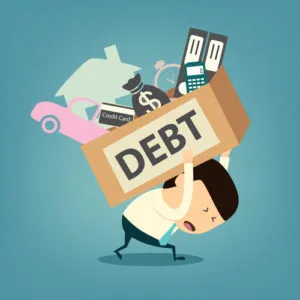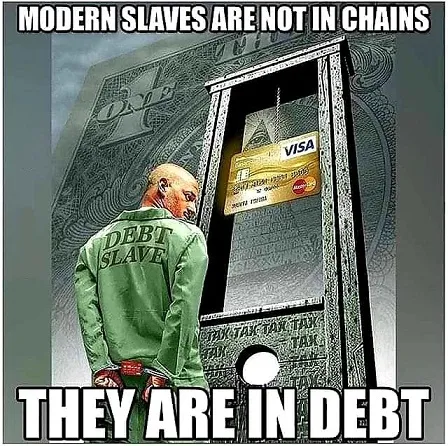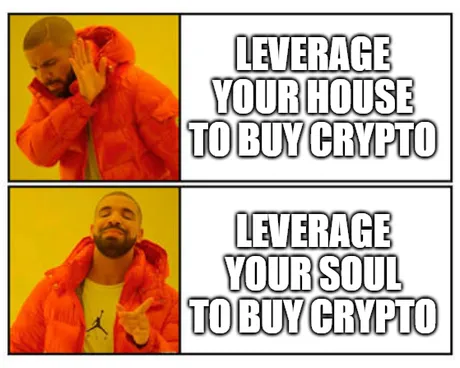
It's hard to imagine a world in which debt doesn't exist.
After all the entire economic paradigm very much revolves around all money in circulation being debt, with more debt needing to be printed just to pay interest on the old debt. How long can such a seemingly unsustainable Ponzi keep the scam going? Well, as long as the collateral that underpins the debt accumulates value over time at a greater or equal rate to the money printers.
The problem with that is that people are collateral, and people themselves are losing their worth within the current system, largely due to automation and other forms of technology that outsource work to machines, overseas, or wherever else. No reason to pay a dozen analysts $50k a year when one can just create a program that does ten times the work for a tiny fraction of the cost (and has the ability to scale near infinitely from there). Advances in AI make the situation even more threatening.

When the layman thinks of debt, nine times out of ten they're going to think about all the bad stuff: the liability of it all. When people think debt they're thinking crippling credit card payments, massive mortgage payments that account for 50% of their income, and perhaps a car loan; a daunting ball and chain dragging us down. In other words: they think about debt in terms of all the bad stuff that happens after the debt is incurred, and rarely about all the assets they acquired by leveraging the debt in the first place.
A successful small business owner doesn't think about debt in this way at all. They approach it in completely the opposite way. "Wow I sure am glad the bank gave me a loan because it would have been impossible to create this business without one." Most people tend to forget about this side of the equation. The ability to just receive a huge pile of money instantly without doing any work for it is amazing. It's magical even.
Unfortunately, as we all know, most people in this world are terrible managers of their own pocketbooks. To a large extent society incentivizes this scenario by design. Stay up to date with the latest fashion trends. Buy cheap products that are designed to break quickly. Live beyond your means. Be obsessed with social status and spend your money in such a way that makes it look like you have more wealth than you actually do. Live paycheck to paycheck. Consume consume consume: consumer.
And there's a very good reason for all this as well. It makes it a lot easier for actual responsible (and wealthy) adults to capitalize and take advantage of such a system that has so much easy money floating around. A fool and his money are soon parted. Then when shit hits the fan because of rampant unsustainability the government just bails out the richest players and ninjas that burden onto the poor using various well documented techniques.

Low interest rates centralize wealth
I jumped into a random Twitter space last night and the conversation was surprisingly insightful. There was a lot of good discussion going on but the one that sticks in my head is this concept that high interest rates are actually a good thing. This is something that I've seen @taskmaster4450 bring up as well once or twice.
The concept is actually pretty simple: people expect a return on their investment.
If interest rates are low the economy is signaling a complete lack of growth. It means that there aren't any places for one to invest and get a good return. If the economy was booming, one would not have to worry about a 10% interest rate on a loan, because the asset that they are acquiring with that 10% liability will more than make up the difference over time.
Of course correlation is not causation. We obviously can't just increase interest rates to make the economy better. A high interest rate on debt simply implies that the economy is expanding at a faster pace than interest, which is a very good macro signal. The fact that we were at 0% rates for so long is a very very bad sign, even though everyone seems to like easy money and a lower rate. After all: a lower rate means you pay back less, right? Assuming you can get a low-rate loan in the first place.
So now we are in a situation where nobody really wants to sell their house because they locked in a 3% 30-year mortgage and it's impossible to get that deal anywhere else within the current economic climate. Imagine what USD is going to be worth 30 years from now. I'm thinking it will lose half its value and than another half again (at best). I mean I think a lot of people round these parts assume the entire system will collapse by then but just bear with me for this example.

This is how low interest rates consolidate wealth.
If USD is going to be worth 25% of today's value in 30 years... well then of course you'd want to hold on to as much cheap debt as possible. Assuming you're still working in 30 years you'd hope to be earning at least x4 or more income just to keep pace with inflation. These wage increases make it extremely easy to pay the mortgage because your payments are the same as they were since the very start of the repayment agreement. Meanwhile, the collateral value of the property itself is also going up (hopefully) which makes it even easier to turn a profit if and when the time comes to sell and settle the loan.
Meanwhile, poor people get none of these benefits. Poor people don't have debt. They have nothing, and they are happy. One might argue, "Of course poor people have debt: they have credit cards," but that is simply not what we are discussing here. When I get a credit card offer in the mail they are trying to get me to pay 27% APR. It is basically not possible to leverage that kind of debt into assets that are going to make up for the difference in interest rates like a 3% 30-year mortgage certainly does.
Instead, low interest rates create that easy-money environment we talked about before. Easy money means higher inflation, and since it's very obvious that the lower class's wages increase lower than inflation, they suffer pretty much the brunt of low-interest rate economics while rich people can leverage as much debt as they can into real assets that are accumulating value over time... while paying back less as the currency gets more and more devalued. That's the theory anyway, economics are actually a lot more complex than this within the real-time simulation of limitless variables.

So what does a society without debt look like?
Essentially what I'm thinking is that crypto will be such a massive upgrade compared to fiat (given proper infrastructure) that there is a very good chance we are never in a position in which we need a loan in the first place. If I have 1000 BTC sitting in my wallet why would I need a loan? I'll just pay for the thing upfront and hope my investment is successful.
In fact, crypto can create situations in which loans and huge lump-sums of money are not even required. Maybe you're thinking, "Wait a minute... what are the odds that your investment actually outperforms Bitcoin? You should probably just hold the Bitcoin instead." Yeah that actually is a very valid point.
The solution to this problem: more crypto!
So say I want to start up a business and I'm looking for seed money. Rather than spend 100 BTC of of my 1000 BTC stash and incur a huge risk, I find 9 other like-minded individuals who want to get down on this at the ground floor. We all chip in 10 BTC and have 100 BTC to start the business.
We then create a new token to represent shares in the company. A stock 2.0 scenario just like BNB or any other exchange token. Obviously this token would have some kind of governance power over the business, and perhaps even other utility could be added to it depending on what the business does. If the business is selling a product or service the most obvious added utility would be giving a slight discount to anyone that pays using the token or perhaps simply anyone with a standing balance.
Now we have a situation where if the business is successful the underlying token can easily go x1000 and absolutely dwarf any kind of move that BTC makes during that time. On top of that the governance of the business is enforced by the blockchain, which cuts out a lot of the middle men like governments, regulators, courts, police, and lethal force from potentially needing to participate.
A system like this is simply far more scalable and organized than anything legacy systems can compete with. What if instead of 10 people on the ground floor it was 100, or 1000? Doesn't really matter the same rules apply in all cases, and the chance of something going wrong (lawsuit) doesn't increase on the blockchain like it would otherwise on a larger scale.

Collateralized leverage.
Protocols like MakerDAO (which I don't personally like anymore but still has sound underlying principals) have shown us that we can use our own money to give ourselves a 'loan' using smart contracts. Once again this allows us to take collateral like BTC or ETH that we don't necessarily want to get rid of and simply lock it up and extract a stable-coin out of the debt-position.
Again, something like this can lead to win/win situations where the underlying collateral (crypto) goes up in value while the liability that needs to be paid back is pegged to USD and basically guaranteed to lose value over time, which is exactly what we wanted. We can think of this less as getting a loan and more like being savvy with derivatives and being able to manipulate the value we have available to us in extremely profitable ways through responsible margin trading.
Insurance as a Loan
As one last final thought I'd like to point out that insurance is also a type of loan. We communally loan the insurance company our money and if something bad happens the unlucky few get a payout to cover the cost of unfortunate happenstances. It's gone so far as to legally require drivers to be insured, which I don't necessarily agree with but certainly can see why it is a thing (99% of the population not being able to afford an emergency expense that large).
The problem with insurance is that the for-profit nature of it makes it inherently a scam by design. By creating a financial incentive to not payout claims, every person that gets unfairly screwed over is simply more money in the company's pocket. It's quite obvious that insurance should be handled by the government directly, or at least exist as non-profit infrastructure, and yet the powers that be do not allow such things because they want a cut of that money. Not even the government wants it because they get to tax it and perhaps even receive campaign donations from for-profit organizations.
Again, crypto can solve such issues. If I have 1000 BTC in the bank I don't need insurance. I can just pay for things that go wrong if they go wrong. "It's only money," becomes a common theme when living at this level of abundance. Even more likely is the ability to create community pools of money using blockchain that create this type of non-profit organization described above. The only reason to deny claims at that point is to prevent insurance fraud and stop bad actors from gaming the system on everyone else's dime.
Conclusion
It's hard to imagine a world without debt. After all we've been entrenched in a purely debt-based system from birth. Up until now (and even now) all economic growth and even the creation of money itself has solely revolved around debt and interest rates. It's been like this ever since the advent of central banking and paper money. Crypto offers an alternative to this, but it is still unclear if debt can vanish completely given mainstream adoption. We also have to wonder if we truly want to eliminate debt or simply give it a makeover. At the end of the day I guess we'll just have to wait and see.
Return from Does Society Need Loans? to edicted's Web3 Blog
